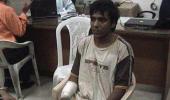Key plotters of the 26/11 terror attacks have once again escaped arrest upon the advice of Pakistan's intelligence agency, Inter-Service Intelligence.

According to International Forum for Rights and Security, the raids pinned seven Lashkar-e-Tayiba operatives, among them, Zaki ur Rehman Lakhvi, whose links to the 26/11 attacks are proved.
Earlier, Tariq Khosa, an influential politician in Pakistan published an op-ed in Dawn, stating in unambiguous terms that the ten gunmen had been members of LeT.
It was also revealed that the terrorists received training in Pakistan's Sindh province, that their control room in Karachi had been located, and that the ship which had transported them to Indian waters had been seized by the Federal Investigation Agency.
Despite its own public acknowledgement as well as the availability of all necessary evidence, including that shared by India, Pakistan is yet to show sincerity in delivering justice to the families of 166 victims from 15 countries across the globe, on the 13th anniversary of 26/11 attacks.
According to International Forum for Rights and Security, in terms of international terrorism, the Mumbai attack underscores the threat posed by a few well-armed and well-trained individuals who could carry out an unconventional attack on unarmed civilians and soft target civilian population.
Further, it raises the critical question of whether the attack may signal a shift in terrorist tactics toward conventional weapons and explosives used in coordinated attacks by small groups, like the Paris attack of 2015.
On the other hand, evidence suggests that Pakistan's State-sponsored terrorism in the 26/11 attacks has been proved from the interrogation accounts of three terrorists -- Ajmal Kasab, David Headley, and Zabiuddin Ansari.
The three played different roles in the attack and were interrogated under different conditions all leading up to an ISI-LeT orchestrated terror attack in Mumbai.











 © 2025
© 2025